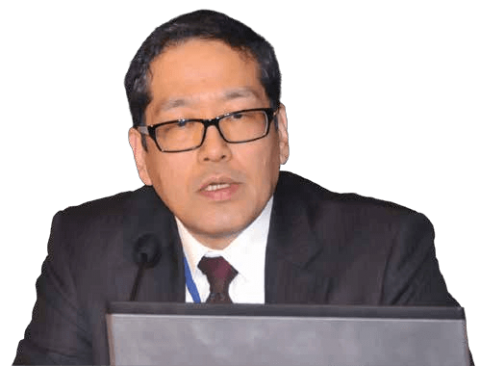Issue:
THE INCREASING TENSION WITH JAPAN’S NEIGHBORS IS BEING EXAMINED FOR ITS POTENTIAL SECURITY IMPACT
Over the past quarter century, the defense and security situation across east Asia has been transformed by a worrying proliferation of advanced missile systems and nuclear weapons.
Since 1996, it has been the task of The National Institute for Defense Studies, a think tank affiliated with Japan’s Ministry of Defense, to monitor the changes in the nation’s neighbors and to analyze their potential impact on this country. The institute’s latest report, released on March 29, once again made sobering reading when it was unveiled to members of the Club at a press conference one day ahead of the official release.
The report, for the first time, examined the security and foreign policies of India and Australia as they increasingly become enmeshed in the military affairs of the region. But inevitably it is China and North Korea that attract the greatest attention and concern.
The study admits that current tensions between Tokyo and Beijing were triggered by last year’s move by Shintaro Ishihara, then Tokyo governor, to purchase the Senkaku Islands. “China reacted furiously to [Ishihara’s] announcement on April 16 of his prefecture’s proposal to buy the islands and to the Japanese government’s decision on Sept. 11 to purchase three of the islands,” the report says
But the NIDS analysts believe a diplomatic assault on the sovereignty of the islands was already being plotted. “The actions that China subsequently took clearly reveal that it was already meticu lously planning measures for advancing its claim over the Senkakus from a very early stage,” the study claims. “China has used the same approach with regard to the South China Sea and shows no hesItation in carrying out actions that cause friction with its neighbors.”
Dr. Eiichi Katahara, director of the Regional Studies Department of the NIDS and editor in chief of the report, said that Japan’s responses throughout the ongoing dispute have been measured and appropriate. “The Japanese government’s stance is that long term, strategically mutual relations will benefit both sides and they want to make sure that individual issues do not ruin the overall relationship,” he said.
Dr. Katahara added that he believes dialogue between the leaders of the two nations could lead to a resolution of many of the problems that continue to bedevil the relationship. He pointed out that the efforts Prime Minister Shinzo Abe made to improve ties the last time he was leader of Japan, in 2007, mean that Beijing may very well be anticipating some sort of “breakthrough in bilateral relations.”

While showing that he is happy to talk, however, Abe has already stated that he will revise the National Defense Program Guidelines drawn up by the previous Democratic Party of Japan administration.
The report states that “the strengthening of Japan’s defense posture in the south western islands will continue to be one of the most important issues.”
In addition to improved intelligence, surveillance and reconnaissance operations, “It has become imperative to strengthen seamless deterrence and response capabilities through improvement of the Self Defense Forces’ mobile deployment capabilities and in preparation for more intense conflicts.”
Beyond that, the SDF requires improved amphibious capabilities and enhanced air defenses, at the same time as the “resiliency” of bases used by the SDF and US military is stepped up.
The report touched on suggestions that China is attempting to build closer relations with Russia and to access advanced technology, such as the recently reported deal to purchase Sukhoi 35 fighters, although a NIDS analyst suggested Moscow is actually becoming increasingly wary about China and its ambitions, and that there is a long way to go before Moscow agrees to the transaction taking place.
North Korea similarly took up a large part of the annual study, with Hiroyasu Akutsu, a North Korea analyst at the institute, expressing concern that while BeiJing appears to be taking a “strict stance” with Pyongyang over its recent missile and nuclear tests, there is no guarantee that will last.
“China has acted strictly in the past, such as in 2009 when North Korea carried out a missile launch and its second nuclear test,” he pointed out. “China at that time signed resolution 1874 in the United Nations Security Council, but five months later it was back supporting North Korea again.
“For China, the top priority is the stability of the region and they do not want to take any actions that will lead to the collapse of North Korea, so they are being very careful,” he suggested.

